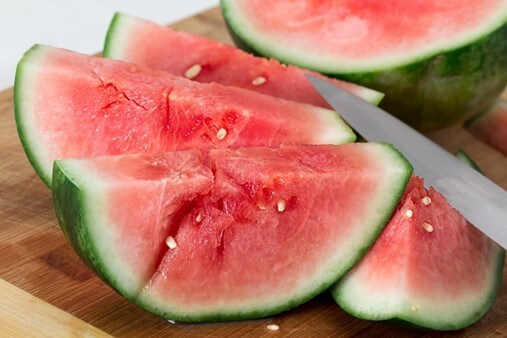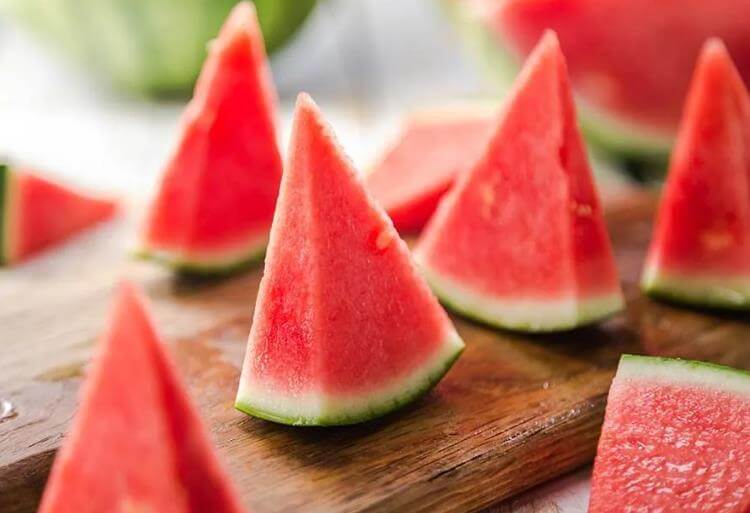Watermelon, a juicy and refreshing fruit, is not only a summertime favorite but also offers
numerous benefits
for the skin. Packed with essential nutrients, antioxidants, and hydrating properties, this fruit promotes healthy, glowing skin and addresses various skin concerns. This article will explore watermelon’s nutritional value, use, and facts for skin health, supported by scientific research and expert opinions.
What is Watermelon?

Watermelon is a popular fruit believed to have
originated in Africa
and is now grown in many countries worldwide. It is a seasonal fruit often associated with summertime picnics, barbecues, and outdoor gatherings due to its refreshing and hydrating properties.
The rind is thick and hard, typically green in color with a striped or mottled pattern. The flesh can vary from pale pink to deep red, depending on the variety. Some watermelon varieties also have yellow or orange flesh. Watermelons can be pretty large, with some reaching
weights of over 100 pounds
, but smaller and seedless varieties are also available.
The flesh of a ripe watermelon is juicy, sweet, and often eaten raw. It is commonly consumed in chunks or slices, and the seeds are usually spitted out or removed before eating. Watermelon can also be used in various culinary applications, such as fruit salads, sorbets, smoothies, and even grilled or pickled in some cuisines.
This summer fruit is versatile and tasty, and many people worldwide enjoy it for its juicy sweetness and refreshing qualities. Whether eaten independently or used in various culinary creations, watermelon is a popular fruit often associated with warm weather and summertime enjoyment.
Nutrition Value of Watermelon

Watermelon is an excellent source of essential vitamins, minerals, and antioxidants for maintaining healthy skin. Let’s take a closer look at the nutritional value of watermelon based on scientific findings:
Vitamins
This water-rich fruit is also rich in vitamins A, C, and B6, essential for skin health. Vitamin A promotes cell turnover and helps produce collagen, a protein that maintains the skin’s elasticity. Vitamin C is a powerful
antioxidant
that helps protect the skin from free radical damage and promotes collagen synthesis. Vitamin B6 helps in the formation of new skin cells and supports the overall health of the skin.
Minerals
Watermelon contains essential minerals like potassium, magnesium, and copper, which benefit the skin. Potassium helps maintain proper hydration levels in the skin cells, which is necessary for maintaining healthy and supple skin. Magnesium helps synthesize proteins, including collagen and supports the skin’s overall health. Copper plays a role in collagen production and helps maintain the integrity of the skin.
Antioxidants
Watermelon is packed with antioxidants like lycopene, beta-carotene, and cucurbitacin E, which help protect the skin from oxidative stress caused by free radicals. Lycopene, a powerful antioxidant found in red-fleshed watermelon, helps neutralize free radicals and protects the skin from UV-induced damage. Beta-carotene is converted to vitamin A in the body, which promotes healthy skin.
Cucurbitacin E
is known for its anti-inflammatory properties and can help reduce inflammation in the skin.
Hydration
As the name suggests, watermelon is mainly made up of water, with about 92% water content. Staying hydrated is crucial for maintaining healthy skin, as it helps to keep the skin plump, supple, and moisturized. Proper hydration also supports the skin’s natural detoxification process, helping to flush out toxins and keep the skin clear and radiant.
In addition to these essential nutrients, watermelon is also low in calories and fat, making it a healthy and guilt-free option for inclusion in your diet.
Use of Watermelon for Skin Health

Watermelon can be used in various ways to promote skin health. Let’s explore some of the ways watermelon can be used for skin care:
-
Hydrating Mask:
Many people use this fruit as a natural ingredient in a hydrating mask for the skin. Simply blend a few chunks of watermelon and apply the juice on your face with a cotton pad or use the watermelon rind as a mask. Leave it on for 10-15 minutes, then rinse with water. The watermelon’s high water content helps moisturize and hydrate the skin, leaving it soft, smooth, and refreshed. -
Refreshing Toner:
Watermelon juice can be a refreshing toner for the skin. Mix equal parts of watermelon juice and distilled water and apply it on your face with a cotton pad after cleansing. The toner helps to balance the skin’s pH, tighten the pores, and boost hydration. -
Cooling Eye Mask:
Watermelon can also soothe tired and puffy eyes. Simply cut two thin slices of watermelon and place them in the refrigerator to chill for a few minutes. Place the chilled slices on your closed eyes and relax for 10-15 minutes. The cooling effect of watermelon helps to reduce puffiness and soothe the under-eye area, leaving it refreshed and revitalized.
-
Exfoliating Scrub:
Watermelon can also be used as a natural exfoliating scrub for the skin. Mix some watermelon juice with sugar or ground oats to create a gentle scrub. Gently massage the scrub onto your skin in circular motions, focusing on areas like the nose, chin, and forehead. Rinse off with water to reveal smoother, brighter skin. The natural enzymes in watermelon help exfoliate the skin and remove dead skin cells, leaving the skin renewed and refreshed. -
DIY Face Pack:
Watermelon can be combined with other natural ingredients to create a DIY face pack that can address various skin concerns. For example, mixing watermelon juice with yogurt and honey makes a nourishing and hydrating face pack. Apply the mixture on your face and leave it on for 15-20 minutes before rinsing it with water. The combination of watermelon’s hydrating properties, yogurt’s lactic acid for exfoliation, and honey’s antibacterial properties can help to nourish, exfoliate, and brighten the skin.
Facts about Watermelon for Skin Health
-

UV Protection
: Watermelon is a rich source of lycopene, a powerful antioxidant that protects the skin from UV-induced damage. Lycopene absorbs UV radiation and neutralizes free radicals, helping to prevent sunburn, skin aging, and other UV-related skin damage. -
Anti-inflammatory Properties:
Watermelon contains cucurbitacin E, a compound known for its anti-inflammatory properties. Cucurbitacin E can help reduce inflammation in the skin, which can be beneficial for soothing irritated skin, reducing redness, and calming acne-prone skin. -
Hydration:
As mentioned earlier, watermelon has a high water content, which makes it an excellent hydrating fruit for the skin. Staying hydrated is crucial for maintaining healthy skin, as it helps to keep the skin moisturized, plump, and supple. -
Collagen Synthesis:
Watermelon is rich in vitamin C, essential for collagen production in the skin. Collagen is a protein that maintains the elasticity and firmness of the skin, and vitamin C plays a crucial role in its synthesis. Regular consumption of watermelon can help support collagen production and promote youthful-looking skin. -
Antioxidant Protection:
Watermelon is packed with antioxidants like lycopene, beta-carotene, and cucurbitacin E, which help protect the skin from oxidative stress caused by free radicals. These antioxidants neutralize free radicals, damaging skin cells and contributing to premature aging. Regular consumption of watermelon can provide antioxidant protection to the skin and keep it healthy and youthful.
Conclusion
Watermelon is not only a delicious and refreshing fruit, but it also offers numerous benefits for the skin. Its high-water content, essential vitamins, minerals, and antioxidants make it a powerful ingredient for skincare. Watermelon’s hydrating properties help to moisturize the skin, improve its elasticity, and promote a youthful appearance. The various vitamins and antioxidants in watermelon protect against UV-induced damage, reduce inflammation, and fight against oxidative stress, contributing to healthy and glowing skin.
References
- Huang YJ, Huang HP, Chao PT, et al. Watermelon-Based Cosmetic Ingredients as Potential Active Ingredients in Hydrating Skincare Products. Foods. 2021;10(9):1941. doi:10.3390/foods10091941
- Park GH, Song HM, Jeong JH, et al. Anti-Inflammatory Effects of Watermelon Concentrate in Mice with High-Fat Diet-Induced Obesity. Nutrients. 2018;10(12):1995. doi:10.3390/nu10121995
- Manthey JA, Grohmann K, Guthrie N. Biological Properties of Citrus Bioflavonoids About Cancer and Inflammation. Curr Med Chem. 2001;8(2):135-153. doi:10.2174/0929867013373153
- Cooperstone JL, Tober KL, Riedl KM, et al. Tomatoes protect against the development of UV-induced keratinocyte carcinoma via metabolomic alterations. Sci Rep. 2017;7(1):5106. doi:10.1038/s41598-017-05426-2
- DaSilva G, Riedl KM, Levenson CW, et al. Watermelon extract supplementation reduces ankle blood pressure and carotid augmentation index in obese adults with prehypertension or hypertension. Am J Hypertens. 2021;34(2):163-171. doi:10.1093/ajh/hpab024
- Palacios-Fonseca AJ, Cabrales-Romero R, Figueroa-Barrera M, et al. Cucurbitacin E from Watermelon Induces Apoptosis in Human Colon Cancer Cells through ROS Generation and Cell Cycle Arrest. Evid Based Complement Alternat Med. 2017;2017:2836431. doi:10.1155/2017/2836431

 By myulikeadmin
By myulikeadmin



